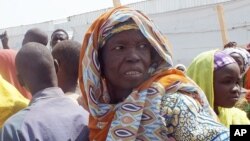Cameroonian refugees displaced by the Boko Haram insurgency in northern Cameroon say they are living in desperate conditions — going without food, water and medicine for days at a time. They complain the government and U.N. agencies are focusing solely on Nigerian refugees and ignoring their needs.
Displaced school children sing here at a government school in Mora in northern Cameroon, some 25 kilometers from the Nigerian border. Their teacher, Feyou Alice, said the children studed under very difficult conditions.
"That one is an overcrowded classroom as you can see. I am just managing. There is no way to even pass [move] in class but I am trying my best. There are illnesses [like] you have cough, fever and since the class room is crowded, they are having wounds on their legs," said Alice.
Lawan Detakone, head teacher of the government school in Kolofata, not far from Mora, said his school was finding it difficult to cope with Cameroonian children displaced by Boko Haram activity in their own country.
He said the more than 500 students in his school had just one portable water source and they did not have even a single latrine. He said they were living under desperate conditions.
The government of Cameroon said at least 70 000 school children and 100 000 people have been displaced by the Boko Haram insurgency. Fekoue Ngaha Joseph, chief of Amang village near Mora, said he has been asking well wishers to contribute and take care of internally displaced persons seeking refuge in his village.
He said for eight months running, they have been moving from mosque to mosque and from church to church asking people to contribute maize, sorghum and millet to feed the hundreds of internally displaced people living in their village.
Moussa Ibrahim, whose three wives and 9 children were displaced from Fotokol two months ago after an attack by Boko Haram fighters left at least 500 dead, said the food they received from the chief, Fekoue Ngaha Joseph, was largely insufficient.
He said because of acute food shortages, they kept the little they had for the sick and children and that they drank pap without sugar and shared each tablet of soap among many people. He said he was pleading with Cameroon authorities, the international community and United Nations agencies to immediately come to their rescue.
The vice president of Cameroon's national assembly, Joseph Mbah Ndam, said Cameroon has been concentrating on fighting Boko Haram and not taking proper care of internally displaced persons.
"The UN high commissioner for refugees takes care of foreigners who have drifted into Cameroon, but who takes care of Cameroonians who have been displaced. I think that the government is not taking care of the displaced. We are thinking about soldiers and we are not thinking of those who are going hungry, homeless and have been driven from their area of subsistence," he said.
Najat Rochdi, coordinator of the United Nations system in Cameroon, said the assistance was urgently needed to save lives of people suffering from the Boko Haram insurgency.
"We need to work on the early recovery of the economy here and you know that the security situation unfortunately is really really having huge impacts on the economy. We have villages of 5 000, 7 000 people so again, thanks to them for their solidarity and generosity, but somehow we need to have a number of accompanying measures so we make sure that social cohesion is there," said Rochdi.
Last month when he visited refugees and internally displaced persons in northern Cameroon, United Nations refugee chief António Guterres said masses of people fleeing the terrorist group Boko Haram have created a crisis comparable to the refugee situation caused by Syria's civil war and a shortfall of international funding was hampering the UN’s ability to help the situation.




